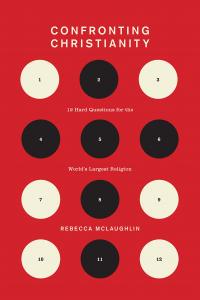 It is all over the news – well occasionally anyway. Religion is in a decline with a significant increase in the number of people claiming no religion. The change is particularly significant among younger adults. Some applaud this trend as bringing enlightenment as we move away from superstition and into a more scientific age. Of course this is a simplification – the reality is more complex. Many of the so-called nones are quite disillusioned with religion – questioning religious teachings as well as the social and political positions taken by many churches. But are the arguments against Christianity compelling? In Confronting Christianity: 12 Hard Questions for the World’s Largest Religion Rebecca McLaughlin argues that they are not. There are reasonable responses to the 12 most common criticisms (the hard questions). This book and these questions are worth some consideration.
It is all over the news – well occasionally anyway. Religion is in a decline with a significant increase in the number of people claiming no religion. The change is particularly significant among younger adults. Some applaud this trend as bringing enlightenment as we move away from superstition and into a more scientific age. Of course this is a simplification – the reality is more complex. Many of the so-called nones are quite disillusioned with religion – questioning religious teachings as well as the social and political positions taken by many churches. But are the arguments against Christianity compelling? In Confronting Christianity: 12 Hard Questions for the World’s Largest Religion Rebecca McLaughlin argues that they are not. There are reasonable responses to the 12 most common criticisms (the hard questions). This book and these questions are worth some consideration.
Aren’t we better off without religion?
Some have argued that religion causes a great deal of harm in this world. It is certainly true that some rather terrible things have been done in the name of religion for deeply religious reasons and religion has been used as an excuse for others motivated more deeply by drives for wealth and power. But does this mean that religion itself is to blame? Perhaps it is better to look at the positive aspects of religion, and Christian religion in particular.
Rebecca notes several positives supported by research. To begin with, relationships are essential to human well-being and religion fosters relationships and provides a broad community. The power of community accounts for a considerable benefit of religion, but it isn’t the whole story. Rebecca goes on to outline seven biblical principles that contribute to well-being – with scientific research to back them up.
(1) Generosity – the bible clearly teaches generosity. It is more blessed to give than receive. “Actively caring for others often yields greater physical and psychological benefits than being cared for.” (p. 23)
(2) Money doesn’t bring happiness and the love of money disappoints. Rebecca notes that a little money can make a big difference, but once a basic level of security is achieved, additional wealth doesn’t have a large correlation with well-being. The New Testament clearly cautions against the love of money.
(3) Work – when it is seen as making a significant contribution beyond a mere paycheck – contributes to well-being. “The apostle Paul encouraged Christian slaves (a significant portion of the early church) that even their work could be a calling, and exhorted them to put their hearts into it, seeing themselves as working for the Lord, not any human master (Col. 3:23-24).” (p. 25)
(4) Contentment – Paul wrote to the Philippians “I know what it is to be in need, and I know what it is to have plenty. I have learned the secret of being content in any and every situation, whether well fed or hungry, whether living in plenty or in want. I can do all this through him who gives me strength.” A general sense of contentment leads to greater well-being. This sense of contentment does not come from having more things or being more successful, or even from being healthy. It is a cultivated and learned state of mind – one to which we are encouraged to aspire. Contentment contributes to human well-being.
(5) Gratitude – Paul again models this for us, commanding the Thessalonians to “Rejoice always, pray continually, give thanks in all circumstances; for this is God’s will for you in Christ Jesus.” Gratitude is an important factor in human happiness, a companion to contentment. Rebecca notes that “Gratitude is buried at the heart of Christianity.” (p. 27)
(6) Self-control and perseverance. Hard to read Paul without seeing the importance of these qualities in Christian life. We look to a future goal not instant gratification.
(7) Forgiveness. Although sometimes overlooked or forgotten, forgiveness is creedal in Christian faith a non-negotiable. We believe in forgiveness – the forgiveness of sins and the command to forgive one another. We are forgiven and we forgive. Not seven times but almost without end. As with the other items in this list, research has shown that an attitude of forgiveness benefits the giver and contributes to human well-being.
So what? The positive aspects and benefits of Christian teachings don’t mean that Christianity is true. Nor is it true that Christian faith is a necessary precursor to the cultivation of self-control, gratitude, generosity, or any of the other attitudes and practices described here. Some or all of these attitudes are championed in other religions as well. But the fact that they are thoroughly Christian does undermine the notion that Christianity is predominantly negative, poisoning both the believers and the community at large.
We are not “better off without religion” and religious practices and attitudes can make significant contributions to human well-being. The Western rat race for success, pursuit of pleasure, and the accumulation of “things” is not an alternative that contributes to happiness and well-being. Stop and smell the roses.
What positives are contributed by religious belief?
What brings human well-being?
If you wish to contact me directly you may do so at rjs4mail[at]att.net
If interested you can subscribe to a full text feed of my posts at Musings on Science and Theology.
















